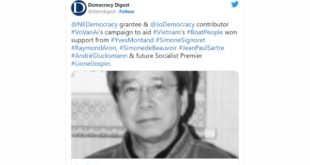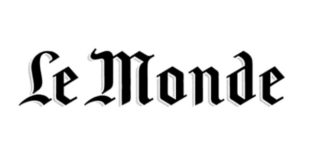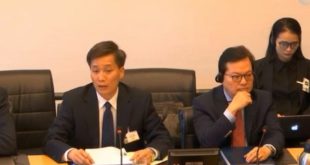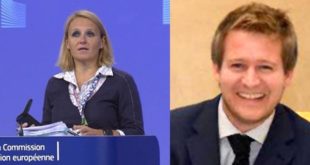The visit to the Giac Minh Pagoda in central Vietnam’s Danang is an apparent move to highlight religious freedom.
 |
|
A suspected plainclothes policeman twists the arm of Thich Thanh Quang outside the Giac Minh Pagoda, Aug. 17, 2012 – Photo courtesy of IBIB
|
A U.S. diplomat has made a rare visit to a pagoda of the banned Unified Buddhist Church of Vietnam (UBCV), which has been the target of consistent harassment by authorities in the one-party communist state, the group said Tuesday.
Kathleen Peoples, a political outreach officer of the U.S. Consulate General in Ho Chi Minh City, made the trip to the Giac Minh Pagoda in Danang last Thursday in an apparent attempt to highlight religious freedom in the country.
“This is the first visit by a U.S. diplomat to the Giac Minh Pagoda,” according to the Paris-based International Buddhist Information Bureau (IBIB), which represents UBCV abroad.
The pagoda is the central office of the UBCV’s Buddhist Youth Movement as well as the head office of the UBCV Quang Nam-Danang Provincial Committee and has been “the target of consistent government harassments and repression for several years,” the IBIB said in a statement.
Peoples was received at the pagoda by Thich Thanh Quang, the 75-year-old head of the Quang Nam-Danang Provincial Committee, who the IBIB said was brutally beaten by youths believed to be plainclothes police in August.
She had asked questions about the pagoda’s activities, such as, “Was it able to conduct activities normally like other Buddhist pagodas, could it receive financial support and offerings, what access to medical care did the monks and nuns at Giac Minh Pagoda have,” according to the statement.
Quang said that police surveillance outside Giac Minh Pagoda was lifted on the day of the U.S. diplomat’s visit for the first time in several years.
“Nevertheless, he showed Ms. Peoples the office of the civil defense police just opposite, where plainclothes officers could be seen behind the windows filming their meeting,” the statement said.
He reported that police resumed their surveillance immediately after the visit, with four or five officers posted permanently outside the pagoda’s gates.
Quang asked Peoples to urge the U.S. government to support the Vietnamese people in their quest for religious freedom, human rights, and democracy, and to press Hanoi to guarantee the rights enshrined in the U.N. treaties that it has signed, the statement said.
Rights groups have asked the U.S. State Department to place Vietnam back on a blacklist of top violators of religious freedom, citing various actions taken by Hanoi.
In his report to the UBCV, Quang said that he hoped this first visit from a U.S. diplomat was “a sign of an increased awareness from the United States on the situation of the repressed UBCV.”
The Giac Minh Pagoda had come under harassment since 1981, when the state-sponsored Vietnam Buddhist Church was created and the independent UBCV was effectively banned.
However, the “repression became significantly more intense” from 2007 after the octogenarian UBCV leader Thich Quang Do, who is now under de facto house arrest, began criticizing China.
He had held protests against Chinese encroachments on the disputed Spratly and Paracel islands and Bauxite mining by Chinese firms and launched an appeal to boycott Chinese products.
Since then, and particularly over the past two years, the authorities have intensified repression, Quang said, citing round-the clock surveillance on the pagoda, a ban on monks celebrating Buddhist festivals, and the prevention of Buddhists entering the pagoda to pray.
“Young monks from Giac Minh Pagoda who went to study in Saigon were denied residence permits on their return, and thus became illegal citizens.”
The pagoda also could not receive donations and offerings because police threatened Buddhists with reprisals if they showed support for the “reactionary monks,” the statement said.
Police also prohibited doctors from coming to the pagoda, obliging monks who fell ill to seek treatment outside, it said.
Even animals were denied treatment.
Quang said he had a sheepdog which kept guard on the pagoda but fell ill and died because police refused to let the veterinary doctors into the building.
“The state says it will take care of everything”, said Quang, “but the dog died anyway.”
U.S. President Barack Obama’s administration has repeatedly called on Vietnam to address human rights concerns, although it has also pushed ahead with greater cooperation with Hanoi including in military exchanges.
Vietnam has jailed dozens of journalists and bloggers who spoke out about corruption, and detained other dissidents for associating with the political opposition.
The U.S. House of Representatives last month passed legislation which would make improvements in human rights a condition for increases in nonhumanitarian aid to Vietnam.
It also adopted a resolution condemning what the House said was Hanoi’s abuse of vague national security laws used to silence dissent.
The legislation still needs passage by the Senate. The House has approved the bill twice in previous sessions, but it has died in the Senate.
Reported by Parameswaran Ponnudurai.
 Quê Me Quê Me: Action for democracy in Vietnam & Vietnam Committee on Human Rights
Quê Me Quê Me: Action for democracy in Vietnam & Vietnam Committee on Human Rights





